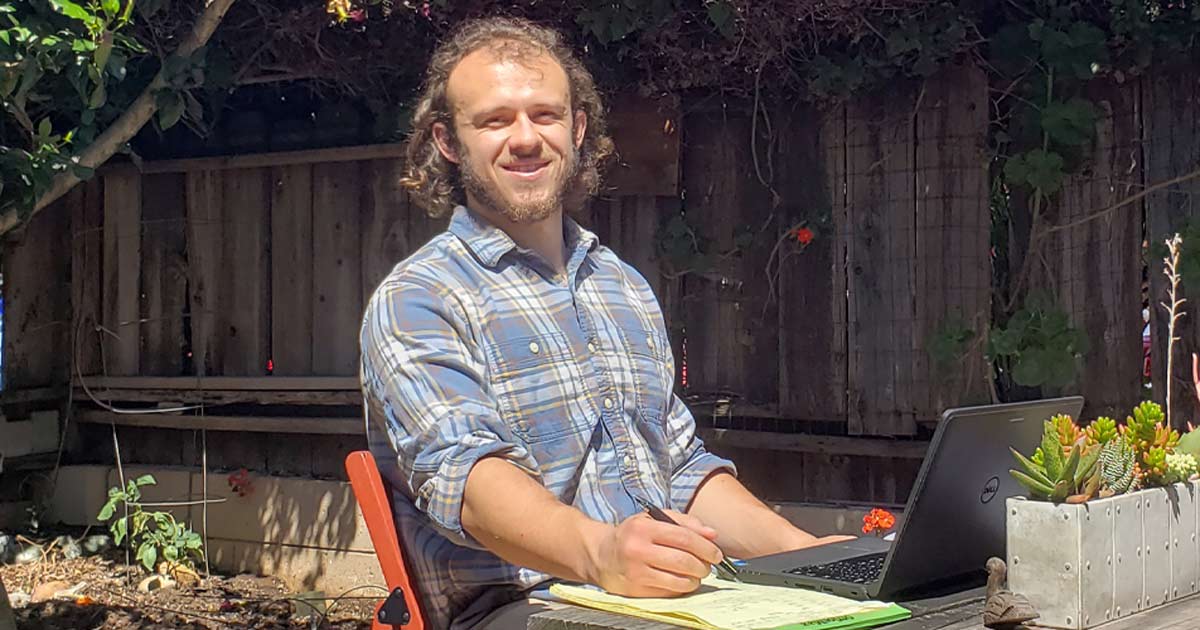
Category: News & Information

Blue Hen Scientist Tackles COVID-19
Most of us probably never imagined that scientific strides toward a COVID-19 solution would be taking place in a living room—or in Sam Modlin’s case, from his bed or front garden in San Diego.
Like many, Modlin has been working from home, but unlike many, much of his work at home is juxtaposed with ever-evolving COVID-19 research.
A UD alumnus from the Class of 2014, Modlin is a project scientist at Laboratory for Pathogenesis of Clinical Drug Resistance and Persistence (LPCDRP) and chief scientific officer of the newly-incorporated company InBiome, which he started in the fall with co-founder Dr. Faramarz Valafar. While both the lab and company are focused on studying the genome of the pathogen that causes Tuberculosis, Mycobacterium tuberculosis, Modlin and staff realized that their methods for genomic analysis could be applicable to other infectious diseases. Therefore, by mid-March, Modlin’s team pivoted some of their efforts to focus on COVID-19.
“Initially, we didn't want to be another non-COVID lab jumping into the COVID-19 research scene without something valuable to contribute,” he said. “We also wanted to be sure not to abandon our TB research (TB was still killing more people per day than COVID as recently as April 1). But as curiosity took over we looked into the research being published on pre-print servers and peer-reviewed journals and realized that some of the methods we have been working on for studying TB might have utility for studying the virus that causes COVID-19 disease (SARS-CoV-2).”
Modlin continues his TB research in addition to the COVID-19 research, alternating workspaces with his roommate, who is an elementary school teacher. Modlin’s day consists of a mix of TB research in the afternoon through evening, then he spends the rest of the evening on COVID research, doing Zoom calls with Dr. Valafar, graduate students and InBiome staff; reading recent COVID studies, programming, and administrative work for InBiome.
“Pacing myself has been the most challenging part,” he says. “Every night it feels like what we are working on is urgent, and I’m tempted to stay up all night working on it.”
At UD, Modlin majored in neuroscience, a far cry from his current field in infectious diseases, but not without transferable skills from his UD experience and education. Under his own proclamation, Modlin didn’t excel as a student in the classroom, so it was important for him to find things outside of the classroom to build his professional skills and confidence.
“As a peer advisor for the Psychology Department, I got incredibly valuable experience in public speaking, planning/coordinating, and in advising. In my current roles, I have to do a ton of all of those things. I would have been far less developed along these trajectories and less willing to take on these responsibilities had I not become comfortable with them at UD.”
Another piece of his UD education changed the course of his career: undergraduate research in Dr. Anna Klintsova’s Neuroplasticity Lab.
“[It] made me realize that I really enjoy research and built up my scientific communication skills substantially. Just as importantly, I learned that I am not very good at ‘wet-lab’ work, nor do I enjoy it. That was very valuable to learn, and was what guided me toward Bioinformatics, which is what I got my graduate degree in, and landed me in Dr. Valafar’s lab.”
When Modlin allows himself some free time each Sunday, he gets together via Zoom with five of his freshman floormates from Harrington E1, who have been the “center” of his social life during the pandemic.
“The network of friends I made at UD have been instrumental in supporting me in every aspect of non-professional life. They’ve loaned me money when I was in grad school to get through some tough spots, have come out and visited me in San Diego, and I’ve connected with more UD alumni through the San Diego chapter of the UD Alumni Club.”
Modlin’s company is working to develop products for treating and diagnosing infectious disease from the methods invented in their lab, which analyze genomes in a way that other labs have not yet approached—the lab exclusively uses “long read” DNA sequencing, which provides a more complete picture of the genetic differences between strains of pathogens. Ideally, they will develop candidates for drugs, vaccines and diagnostics.
“It’s really cool to be involved in such a dynamic scientific pursuit,” said Modlin. “The speed of studies being completed and results reported is unlike anything I’ve experienced. Something you’re doing on your computer in your living room could become world news overnight. That part is wild.”

